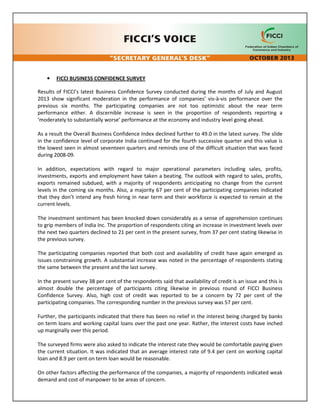The document discusses the results of FICCI's latest Business Confidence Survey. It finds that business confidence has declined significantly, with companies reporting moderate to substantially worse performance over the last six months and being not too optimistic about near term performance. The Overall Business Confidence Index declined to its lowest level in 17 quarters. Expectations for key indicators like sales, profits, investments, exports and employment are subdued. Access to credit also emerged as a major issue, with more companies reporting high credit costs and limited availability. Measures like improving infrastructure, expediting stalled projects, simplifying business policies and procedures, and interest rate cuts are suggested to revive growth.











